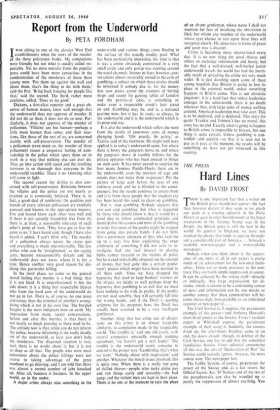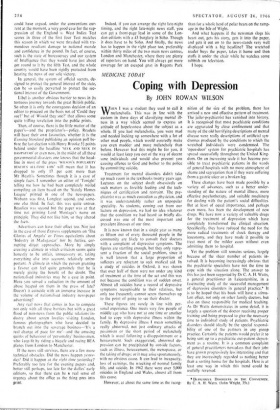Hard Lines
THE PRESS
By DAVID FROST
THERE is one important fact that a writer on the British press should not ignore—the fact that, however distant it may seem as we gnash our teeth at a rousing editorial in the Daily Sketch or gaze in utter bewilderment at the latest revelations in the Terence Stamp saga in the People, the British press is still the best in the world. In general in England, we have not reached the choice that tends to operate through4 out a considerable part of America ... between a readable non-newspaper and a non-readable newspaper.
Indeed, when you think about it, the appear- ance of any news at all in our papers is pretty much of an achievement for the newsmen them- selves. There are so many pressures to the con- trary.They start with simple suppression at source. It can be achieved by the source itself—directly or indirectly. Any large organisation, for in- stance, which is known to be a continuing source of news and information can by one means or another convey that these commodities will be- come increasingly non-available to an individual reporter or newspaper if....
The Civil Service is, I suppose, the paramount example of this power—and Anthony Howard's short-lived tenure as the Sunday Tinzes's resident expert in Whitehall exposes the paramount example of their using it. Suddenly, the sources dried up, the after-hours briefings came to an end, the doors closed—though, in defence of the Civil Service, one has to add that the somewhat injudicious Sunday Times editorial announcing all this was the sort of 'Declaration of War' the Service could scarcely ignore. Anyway, the news source won. The newspaper lost.
The Lobby System, of course, perpetuates the power of the Source and, as a last resort, the Official Secrets Act, 'D' Notices and all the rest of the paraphernalia can also be trundled up to justify the suppression of almost anything. You
could have argued, under the conventions cur- rent at the moment, a very good case for the sup- pression of the England v. West Indies Test scores in three of the first four Test matches this season in which we were thrashed with tre- mendous resultant damage to national morale and confidence in the pound. In fact, of course, such is the state of bureaucracy and our system of Intelligence that they would have just about got round to it by the fifth Test, and the whole country would have been rigidly protected from hearing the news of our sole victory.
In general, the system of official secrets, de- signed to protect the general interest of the state, can be so easily perverted to protect the sec- tional interest of the Government.
Libel is another obvious barrier to news in its tortuous journey towards the great British public. So often it is only the courageous decision of an editor to proceed on the basis not of 'Could they sue?' but of 'Would they sue?' that allows some quite trifling revelation into the public prints.
Then, of course, there is the little matter of the paper's—and the proprietor's—policy. Readers will have their own favourites, whether it is the Evening Standard publishing an opinion poll be- fore the last election with Henry Brooke 5+ points behind under the headline 'NECK AND NECK IN HAMPSTEAD' or even now, in the midst of all these governmental disasters one knows that the head- line in most of the press 'WILSON'S POPULARITY REACHES ALL-TIME LOW' will mean that it has dropped to only 17 per cent more than Mr Heath's. Sometimes though it is a case of simple facts. I remember an editor of 'Tonight' telling me how he had been completely misled compiling an item based on the 'Stately Homes League' printed in one of the newspapers. Woburn was first, Longleat second, and some- one else third. In fact, this was quite untrue. Beaulieu was second but the paper was at that time not printing Lord Montagu's name on principle. They did not like him, so they altered the facts.
Advertisers can have their effect too. Not just in the case of those Express supplements on 'The Glories of Angola' or Times equivalents about 'Industry in Madagascar' nor by furtive, cor- rupting direct approaches. More by simply creating a climate in which criticism seems quite honestly to be unfair, unnecessary or, taking everything else into account, relatively unim- portant. A climate in which the person granting a favour can feel quite genuinely that he is merely giving the benefit of the doubt. The nationalised industries may be a case in point. Have you sensed a reduction in the amount of abuse heaped on them in the press of late? Doesn't it coincide with an immense increase in the volume of nationalised industry newspaper advertising?
Any real news that comes in has to compete not only with all these barriers but with a great flood of non-news from the public relations in- dustry about screen lovelies visiting London, famous photographers who have decided to branch out into the sewerage business—`It's a real change of pace for me'—and the amusing quirks of behaviour of 'personality' businessmen, who keep fit by riding a bicycle and racing BEA planes from London to Manchester.
If the news still survives, there are a few more technical obstacles. Did the news happen yester- day? Did it happen at the right time yesterday? Preferably too late for the evening papers and, better still perhaps, too late for the dailies' early editions, so that there can be a real sense of urgency about the office as the thing goes into print.
Indeed, if you can arrange the right late-night timing, and the right late-night news staff, you can get a front-page lead in some of the Lon- don editions with a £3 burglary in Soho. Though it does have to be Soho. And finally, the news has to happen in the right place too, preferably within thirty miles of the two main news centres, London and Manchester, where there are plenty of reporters on hand. You will always get more coverage for an escaped gnat in Regents Park than for a whole herd of polar bears on the ramp- age in the Isle of Wight.
And what happens if the newsman slogs his heart out, gets his story, gets it into the paper, and gets it out on to the news-stands very well displayed with a big headline? The wretched reader • buys the paper, takes it home and then stuffs it under the chair while he watches some rubbish on television.
I hope.































 Previous page
Previous page